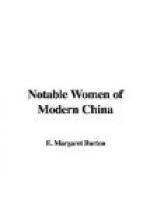When the Manchu governor of Nanchang was captured he was taken to Kiukiang, where, in chagrin at his imprisonment, he attempted suicide. Deserted by his servants and soldiers, he would have died alone and uncared for had it not been for Dr. Stone, for no one else dared to go near him. Dr. Stone and two of her nurses cared for him until the death which they could not prevent, but which they made far easier than it would otherwise have been. It was this same governor who, but a few months before, had refused Dr. Stone the rights of Chinese citizenship because, in purchasing land for a men’s hospital at Kiukiang, she was buying property for foreigners.
When the leaders of the revolutionary party learned that their prisoner had committed suicide they were greatly disturbed. None of them dared to carry the news to General Ma, lest, in accordance with an old Oriental custom, he should punish the bearer of ill tidings. In their perplexity they went to Dr. Stone and asked her to take the news to the general. Accordingly the little doctor, accompanied only by one of her nurses, went to the general’s headquarters to break the news to him. It is significant, not only of the universal respect accorded the doctor, but also of the new position accorded woman in China, that these women, who ventured unattended into a soldiers’ camp, were received with every courtesy. General Ma asked the doctor many questions about her work, and at the close of their interview exclaimed, “When things are settled once more, I intend to find support for such a work; the Chinese ought to help it.”
Because of the disturbances caused by the Revolution, many students in the Kiukiang schools returned to their homes. The family of one young woman insisted that she make use of this enforced vacation to become married to the young Chinese to whom she had long been engaged. The marriage was unwelcome to her, for she was a Christian and the man was not, but as she was the only Christian in her family she received no sympathy from them, and the wedding was set for Christmas day. The parents, however, yielded to their daughter’s earnest desire for a Christian ceremony, and her brother was dispatched to Kiukiang to seek Dr. Stone, who had been eminently successful in all kinds of operations and might surely be relied upon to tie a satisfactory marriage knot. Dr. Stone accordingly left all her Christmas engagements, and accompanied by a Chinese pastor and one of her nurses, set out, through a heavy snow storm, for the girl’s home. When the wedding guests were all assembled, Dr. Stone said that she would like to say a few words before the ceremony took place, and for an hour and a half she told her hearers of the Christian good tidings. The result was that when the wedding was over the mother and father of the bride brought their idols to her, and allowed their daughter to apply the match to them, for both had determined to become Christians. The father said that he wished other people to hear the good things Dr. Stone had told them, and would give the land for a Christian school. The bridegroom volunteered to do the carpenter work which would be necessary before a school could be opened, and now the young wife is teaching a group of children who have entered this new Christian school, and in the new home husband and wife daily unite in morning prayers.




